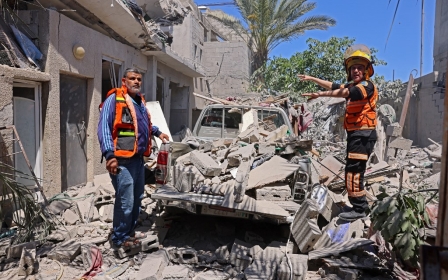Google workers urge CEO to support Palestinians amid war on Gaza

A group of Jewish Google employees is calling on the tech giant to increase its support of Palestinians amid Israel's deadly bombing campaign in Gaza, which has killed more than 200 people, including dozens of children.
In an internal letter, Google workers urged CEO Sundar Pichai to put out a statement condemning the attacks, including "direct recognition of the harm done to Palestinians by Israeli military and gang violence".
"Palestinians are overwhelmingly affected by the militarized colonial violence occurring in the region," the letter read.
"Please heed the requests framed by Palestinian Googlers and center their voices going forward."
The employees also called on Google to terminate any business contracts that support "Israeli violations of Palestinian human rights", including the Israeli military.
The letter currently has 250 signatures, from both Jewish employees and "allied Googlers". It was first reported on by The Verge.
The request is coming from a new employee resource group (ERG), called Jewish Diaspora in Tech, which formed last year in response to pro-Zionist sentiment within "Jewglers" — Google’s official Jewish ERG, the tech news site reported citing two current employees.
“We were compelled to form our own space because of the fact that we were quite literally not allowed to express our viewpoints in the ERG,” a product marketing manager in the group told The Verge.
The letter also calls on Google and its executives to protect and support the freedom of speech, emphasising that criticism of Israel is not antisemitic.
"We ask Google leadership to reject any definition of antisemitism that holds that criticism of Israel or Zionism is antisemitic," the letter read.
"Anti-Zionism is not antisemitism and this conflation harms the pursuit of justice for Palestinians and Jews alike by limiting freedom of expression and distracting from real acts of antisemitism."
Middle East Eye delivers independent and unrivalled coverage and analysis of the Middle East, North Africa and beyond. To learn more about republishing this content and the associated fees, please fill out this form. More about MEE can be found here.





